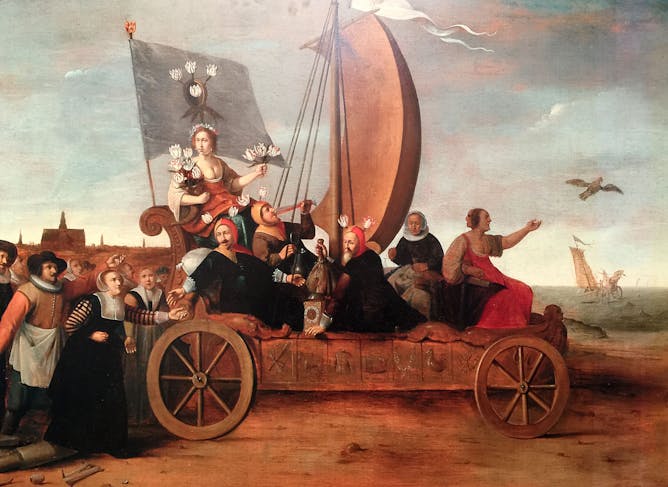| |
|
|
|
|
|
|
| |
|
Editor's note
|
|
For a few months in the 1630s, people in Holland went crazy for tulips. Fortunes were made as investors speculated on flowers that hadn’t even grown yet, and when the bubble burst it left the economy in ruins. “Tulip mania” is a classic piece of economic folklore, says historian Anne Goldgar, but the reality was rather different. Though there certainly was a financial bubble, the more outlandish details were a fiction invented by Dutch satirists to make fun of the flower traders.
LSD, ecstasy and cannabis are way safer than alcohol and tobacco – that’s not opinion, it’s scientific fact. When people visit their doctor, they expect to be treated with evidence-based medicine, so why don’t they demand evidence-based drug laws? Ghaith Aljayyoussi suggests three reasons for this paradox.
Black Panther, the new Marvel movie, is out this week. It’s a milestone in superhero cinema, with a black lead starring alongside a majority black cast. Lydia Zeldenrust explains the history of the film and how Black Panther has a surprising medieval connection.
|
Will de Freitas
Environment + Energy Editor
|

|
|
Top stories
|

Floraes Mallewagen (Flora's wagon of fools): Hendrik Gerritsz Pot, c1640 (photo: Laura Blanchard)
Anne Goldgar, King's College London
Bitcoin is being compared to tulips, but I researched tulip mania for years and found no evidence of mass bankruptcies or economic meltdown.
|

Syda Productions/Shutterstock
Ghaith Aljayyoussi, University of Liverpool
LSD is far safer than alcohol or tobacco, so why don't drug laws reflect it?
|

Image.net
Lydia Zeldenrust, University of York
The new Black Panther film has a lot in common with medieval romance tales.
|
Education
|
-
Ceri Brown, University of Bath
Schools minister Nick Gibb seems to think young people should face more frequent testing, to prepare for GCSEs. His comments fly in the face of 20 years' research.
-
Nicola Bowes, Cardiff Metropolitan University; Karen De Claire, Cardiff Metropolitan University
More than 90% of teens are reportedly experiencing some form of relationship abuse.
|
|
Business + Economy
|
-
Raquel Ortega-Argilés, University of Birmingham; Philip McCann, University of Sheffield
Why the areas that voted Leave are likely to be hardest hit by Brexit.
|
|
Environment + Energy
|
-
Aled Jones, Anglia Ruskin University
The European Investment Bank's funding of the Trans Adriatic Pipeline will harm the climate and makes little financial sense.
|
|
Science + Technology
|
-
Bettina Büchel, IMD Business School
Apple's closed system may be its undoing in the smart home market.
|
|
Politics + Society
|
-
Steven Barnett, University of Westminster
Previous government aid packages for local papers have instead helped Fleet Street's 'big beasts'.
-
Vassil Girginov, Brunel University London
The politics of Russia's Olympic doping ban.
-
Irene A Reid, University of Stirling; Hee Jung Hong, University of Stirling
Korea's fielding of a unified Olympic team is an intriguing narrative of sport, international diplomacy and gender equality.
-
Andreas Johansson, Lund University
The Maldives' increasingly polarised religious politics are coming apart.
|
|
Arts + Culture
|
-
Christopher Shoop-Worrall, University of Sheffield
The two papers were once titans of publishing. But their future looks less rosy.
-
Ozge Ozduzen, Lund University
New, extreme levels of censorship in Turkey could lead to waves of digital activism by tech-savvy generations.
-
Stephen Cottrell, City, University of London
Kim Jong-un's favourite act won hearts and minds when they performed on day one of the Winter Olympics.
-
Dave Collins, University of Central Lancashire
Flirting with danger with each trick, freeskiers and snowboarders must learn to manage the emotions of such a daredevil sport.
|
|
Health + Medicine
|
-
Carol Williams, University of Brighton
The sugar tax relies on creating a price difference between high- and low-sugar drinks, but this could be cancelled out by bundled offers, such as fixed-price meal deals.
|
|
| |
Featured events
|

|
Bowland auditorium, Berrick Saul building, York, York, YO10 5DD, United Kingdom — University of York
|

|
Wivenhoe Park, Colchester, Essex, CO4 3SQ, United Kingdom — University of Essex
|

|
Arthur Lewis Building, University of Manchester, Oxford Road, Manchester, Manchester, M13 9PL, United Kingdom — University of Manchester
|

|
Dover Street Building, The University of Manchester, Manchester, Manchester, M13 9PL, United Kingdom — University of Manchester
|
|
|
|
| |
| |
| |
| |
| |
|
|
|
|
|
|
|
|